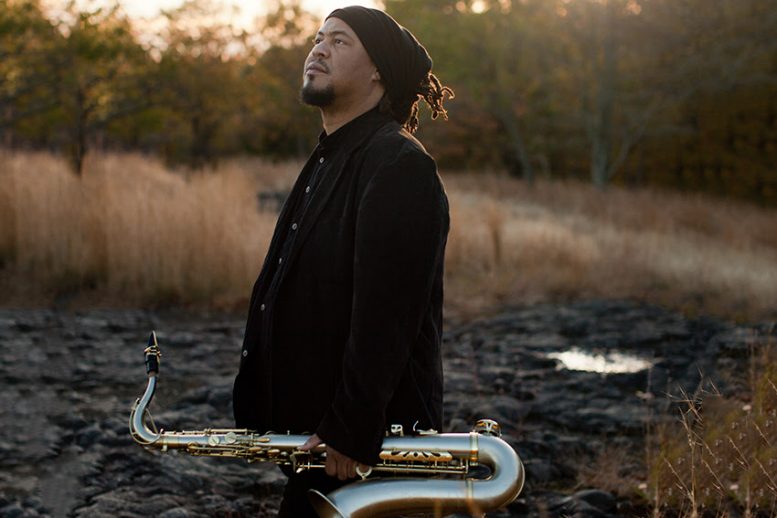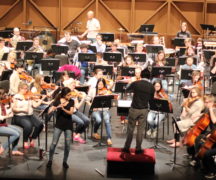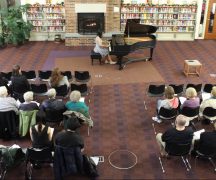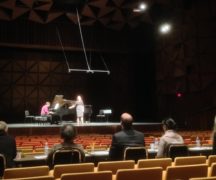By DAVID DUPONT
BG Independent News
Saxophonist and composer Dayna Stephens wants students to know that all the technical information and trickery they are learning are just tools.
Those tools need to be applied “to more accurately, more clearly, telling whatever story they have inside of them.”
The New York-based musician will visit Bowling Green State University next week as the headliner for Jazz Week. He’ll play with the jazz faculty on Thursday at 8 p.m. in Bryan Recital Hall and on Friday at with the Jazz Lab Band I in Kobacker Hall. Thursday’s show is free. Friday’s concert is a ticketed event.
Asked during a telephone interview what he tries to convey to students, he said he tells them “not to focus too much on the technique.” They need to tell “an engaging story” in “a unique voice.”
Stephenson said he forged his own voice — a burnished, well ripened sound — by listening to saxophonists as diverse as swing legend Lester Young and jazz fusion master Michael Brecker.
“I love them both,” he said. “Having those two big influences is bound to produce something a little different.”
Stephens, 40, has been recognized by Downbeat magazine as one of the music’s Rising Stars.
David Bixler, the director of jazz studies at BGSU, said that he invited Stephens to campus on the recommendation of a student, though has also heard with Stephens perform shows with pianists Kenny Barron and Fred Hersch.
Stephens’ ears are tuned to the other musicians he’s working with regardless of what instruments they play or whether they are masters such as pianist Barron or players younger than himself.
“I’m still trying to understand what drummers do,” he said. “The attempt will also lead to unique ways of expressing myself.”
Known as a saxophonist, he has also performed professionally as a bassist. That’s been essential to his approach. “Having people relying on your beat makes your sense of rhythm stronger.” That firm sense of time is important whether he’s in the rhythm section or the frontline.
Also playing bass taught him the value of using simpler melodic ideas. “You can’t play everything you play on a saxophone.”
Listening has been at the core of his musical growth. “My dad pointed out he could tell who different saxophonists were just by listening to them,” he said. “That hint alone made me listen a little closer to what made Grover Washington sound like he did and Sonny Rollins sound like he did.”
Growing up in the San Francisco Bay area, Stephens studied piano for a few years when he was a child. Though he always had an interest in music, “I didn’t really take to it.” Then in seventh grade he had an open period in his schedule, so he started playing saxophone in the band. “Saxophone I took to immediately.”
His grandfather had played saxophone in jazz and rhythm and blues bands when he was younger. That only added to the instrument’s appeal. When Stephens started playing, his grandfather also got his horn out.
Stephens played in the school bands, and he audited classes Laney College in Oakland taught by Bay area jazz legend Ed Kelly.
“I got to hang out with cats who did it for a living,” Stephens remembers. “They would tell stories and we’d learn tunes.”
He relished that sense of community. He played some gigs around town, and Kelly hired him for his band at times.
Then Stephens headed east to study at Berklee College of Music in Boston.
Just as he was touching down in Boston though, his mother called. He had to find a nephrologist immediately. He’d been diagnosed with the rare kidney disease, focal segmental glomerulosclerosis.
“I went through college not having to deal with it head on other than taking medication. Obviously it was in the back of my mind the whole time.”
He completed his studies at what was then the Thelonious Monk Jazz Institute (now the Herbie Hancock Jazz Institute.)
He settled into New York City to forge a career, and deal with his disease. In 2009, he started dialysis. That rooted him to the city because seeking treatment on the road was difficult and expensive. Travel out of the country was out of the question.
“I wanted get as much music out as possible,” he said. He recorded an album or two every year during that period.
“Because as a player I didn’t have the stamina I had before, it made me a more patient player.”
Then in 2015, his aunt stepped up to be a kidney donor in a three-way paired donation where her kidney went to one patient, and another kidney to another, and another to Stephens. That way, Stephens noted, two other people got extensions on life.
“You just don’t take things for granted after going through an experience like that,” he said. “It changes you forever. I find myself overly appreciative of everything I have, that I’m able to still do. I’m realizing the things I do now are not possible without the generosity of my aunt, technology, the docs, and all those who supported me during that time. It’s forever a part of me.”
Not surprisingly he titled his newest recording “Gratitude.”
Now he’s able to head off to Europe with Barron.
Stephens said he appreciates the elder musician’s approach to composing. “He knows how to write a theme that’s memorable, not just a bunch of notes splattered on the paper, but a vehicle for self expression.”
Often students will try to pack all the tricks they know into one composition, and end up performing with their heads buried in the music.
Barron, he said, often has musicians learn the music by ear.
This approach “makes me really appreciate the beauty of simplicity and how much it allows for actual conversation among musicians.”
Along with work for other leaders, Stephens also teaches at the Manhattan School of Music. More and more he’s fronting his own ensembles, giving voice his own sound.
“I’m just trying to create a world that all within earshot can escape into. I want to create conversations among the players that anyone walking off the street can feel they’re welcome to join into. … I want to create some memorable moments that they can appreciate even after the show is over, after the meeting of audience and band have ceased.”
At BGSU he will get the rare chance to hear the music he’s written for big band. He’s only heard all these half-dozen charts performed together once at a show at Berklee a couple years ago.
The night before he’ll be performing with an ensemble of musicians he’s never met before. “I personally like it,” he said. “I generally don’t like to control things too much. I put as much as I can on paper and let the interpretation happen. … It’s not about the accuracy of what’s on the page. Some parts are technically difficult. I don’t mind those being a little rough around the edges. I think of it as character rather than wrong per se.”





